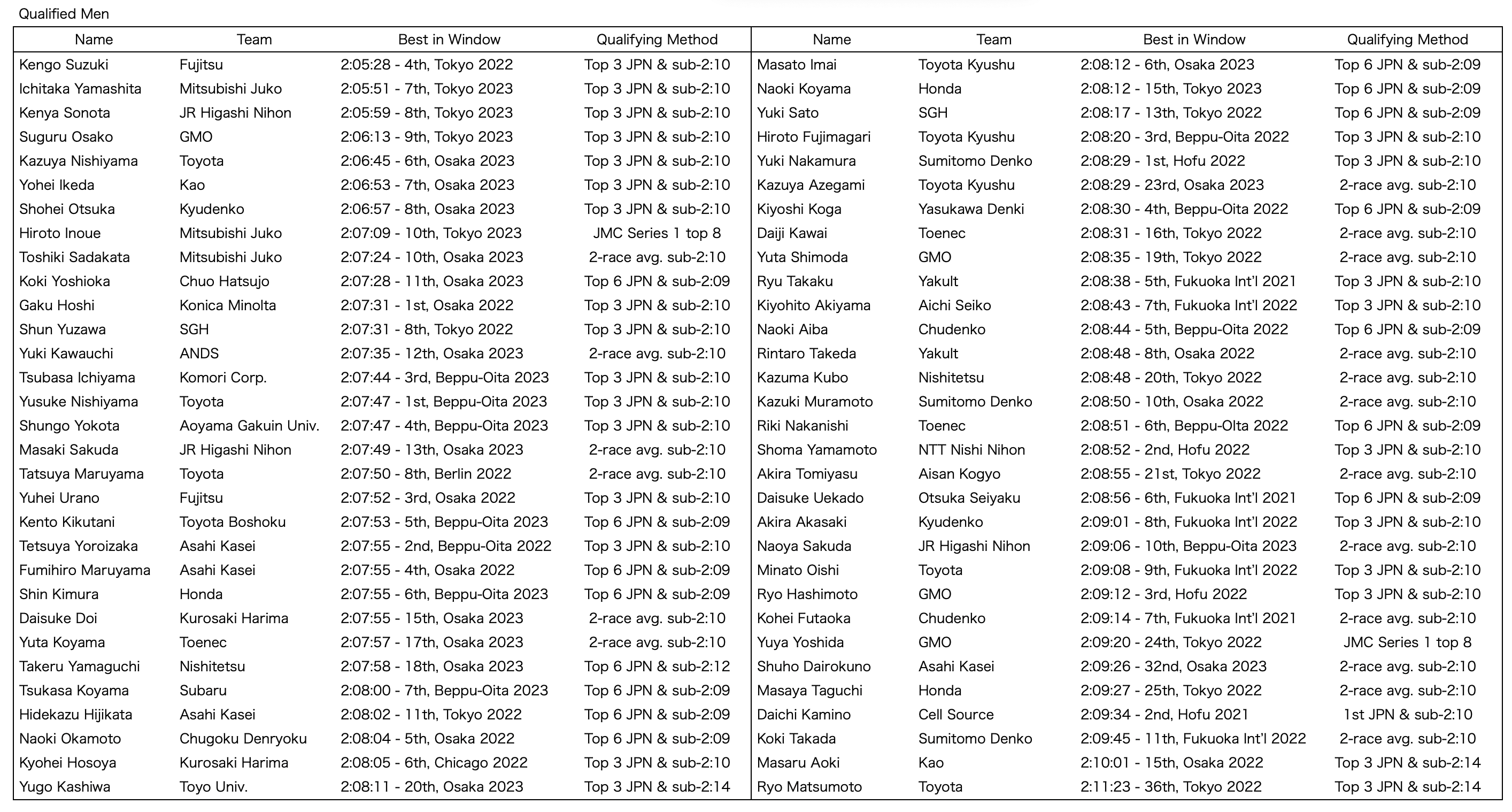The deadline for qualifying for the trials is May 31, and there are still a few smaller domestic races like this Sunday's Tokushima Marathon and April's Nagano Marathon, and overseas races with a World Athletics elite label or better where those who haven't qualified yet can try to make a miracle happen. But for the most part, almost all the real contenders are already in.
62 men and 29 women have qualified at this point. It's really interesting that both of these are double the number who qualified for the first MGC race ahead of the Tokyo Olympics, 34 men and 15 women, even though the men's standards are tougher this time. About half the men and half the women qualified by being in the top 3 Japanese finishers in the race where they qualified and under the designated time standards. Another 15 men and 10 women made it by placing in the top 6 Japanese in their race and under tighter time standards. 18 men and 4 women qualified by running 2 marathons averaging 2:10:00/2:28:00 or better since the qualifying window opened on Nov. 1, 2021.
For those who haven't qualified yet and are planning to race internationally in April or May, they can get in with 2:08:00/2:24:00 or better. But realistically the 2-race average is the more likely criteria to shoot for. Not including qualifiers or people who've retired, another 55 men and 10 women have run a marathon 2:12:00/2:30:00 or better inside the qualifying window, putting them within a reasonable range of hitting the 2-race average marks.
Out of those, 19 men and 2 women ran their first race under 2:10:00 or 2:28:00, meaning they could run another race slower and still make it. Kento Nishi leads the men with a 2:08:11 in Osaka last month and would only need to run 2:11:49 by May 31 to qualify. Yuri Karasawa is the fastest woman with a 2:27:27 also in Osaka and needs to run 2:28:33. In a lot of cases the people who ran slower than 2:10:00 or 2:28:00 would need to run a PB to get in. Takashi Soma ran 2:11:50 in Nobeoka in February and would need to pull out a 2:08:10. Shiho Kaneshige had a 2:29:26 in Tokyo last year and would need a 2:26:34. All of the women who made the Tokyo Olympics have qualified this time, but the top 2 men at the last trials, winner Shogo Nakamura and runner-up Yuma Hattori, have yet to make it.
Japan being Japan there's a good chance a few people like that will drop something big, but the chances are we'll see a few more men pull off last-second qualification but very few or no more women. Apart from Tokushima and Nagano, the overseas races whose results the JAAF will accept for trials qualification are:
- Mar. 19: Chongqing Marathon, CHN
- Mar. 19: Wan Jin Shi Marathon, TPE
- Mar. 19: Rome Marathon, ITA
- Mar. 19: Seoul Marathon, KOR
- Mar. 19: Wuxi Marathon, CHN
- Mar. 19: Barcelona Marathon, ESP
- Mar. 26: Suzhou Taihu Marathon, CHN
- Apr. 2: Xiamen Marathon, CHN
- Apr. 2: Daegu International Marathon, KOR
- Apr. 2: Paris Marathon, FRA
- Apr. 16: Rotterdam Marathon, NED
- Apr. 16: Shijiazhuang Marathon, CHN
- Apr. 16: Wuhan Marathon, CHN
- Apr. 17: Boston Marathon, USA
- Apr. 22: Qingdao Marathon, CHN
- Apr. 23: London Marathon, GBR
- Apr. 23: Vienna Marathon, AUT
- May 7: Prague Marathon, CZE
- May 28: Jilin International Marathon, CHN
- May 28: Ottawa International Marathon, CAN
Given history the European marathons will draw some numbers, but as the real last chance Ottawa is probably going to be the one that ends up with a planeload of Japanese marathoners like Hamburg before the last trials when the deadline was a month earlier. We'll update with final numbers after the May 31 deadline.





Comments